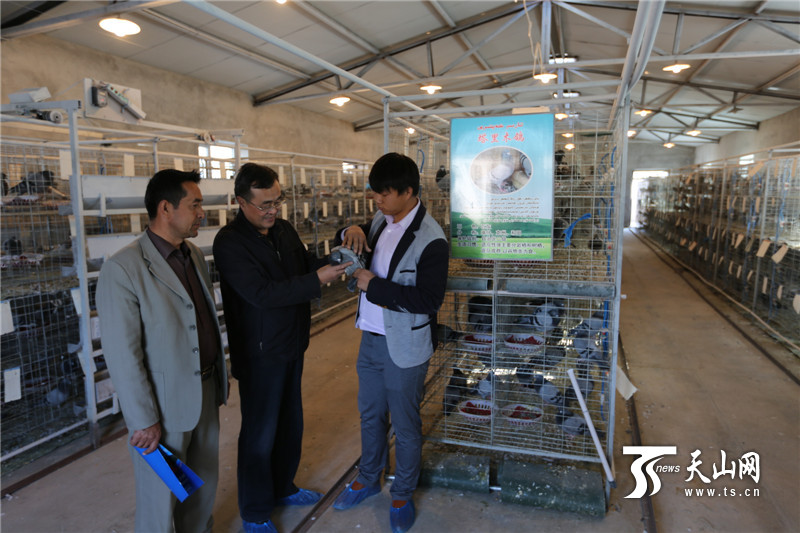Dingxi, Gansu: "Potato Egg" becomes "Golden Egg" for Peasants to shake off Poverty and become Rich
The wind blew hard and the yellow leaves were everywhere. "eat potato eggs." In Yangzhuang Village, Huichuan Town, Weiyuan County, Dingxi County, Gansu Province, Liu Shiquan, a 48-year-old farmer, took out several baked potatoes from a coal stove for reporters to taste.
In recent years, by building the potato industry and promoting the upgrading of the whole industrial chain from seed potato breeding to staple grain processing in Dingxi and other places in Gansu, farmers used to be "life-saving potatoes" and "potato eggs". Now it's a "golden egg" to get rich.
In the past, the more than 10 mu of arable land in Liu Shiquan's family could barely make ends meet. "at that time, the purchase price of one jin of potatoes was ten or twenty cents, and some of them were sold and ate, and the days passed." He said.
Dawdling has changed since 2009. He signed an order contract with Gansu Tiandi Agricultural Science and Technology Co., Ltd., which provided him with high-quality original potatoes free of charge, and then recovered the original potatoes bred by the company above the market price. This year, the original income of the 3 mu potato bred by Liu Shiquan is more than 8000 yuan. The original seed provided by the company for free is worth more than 6000 yuan, and high-quality seeds can guarantee the income.
Du Honghui, a technician of the company, said that in recent years, the company has been adopting the model of "enterprises + farmers" to provide farmers with original potatoes of high quality free of charge, and then recycle the original seeds bred by farmers at 10% higher than the market price. At present, the company has built 4345.5 mu of original seed bases in four townships in Weiyuan, involving 1258 households and 5510 people. It will increase the per capita net income of farmers by about 1500 yuan per year.
Xu Jingyi, director of the potato office in Weiyuan County, told reporters that Weiyuan is a typical cold, damp and cool area with high altitude and large temperature difference between day and night, and its geographical conditions and climatic characteristics are very suitable for seed potato breeding. In 2015, 18 potato industrial bases were built in the county, attracting 7530 poor households to participate in the construction of the industrial base, with an increase of more than 2500 yuan per household.
In Dingxi, the capital of potato, the continuous expansion of the breeding scale of improved potato varieties has promoted the great development of the industry. Since 2008, the planting area of potato in Dingxi Anding District has been maintained at more than 1 million mu, and the total output has been stable at more than 1.3 million tons. Moreover, a number of local enterprises have tried to take the lead in the potato staple strategy, and have made some achievements.
In fact, potatoes have long been the main food rations for farmers in western China. For a period of time, in potato producing areas such as Dingxi, the "life-saving potato" and "potato eggs" covered with soil have gradually upgraded and transformed into beautifully packaged popular food.
Data show that at present, Dingxi has developed 18 categories of potato staple food products, and the processing capacity of potato staple food products has reached 100000 tons. Potato staple food and leisure products include steamed bread, bread, biscuits, French fries, potato powder and so on.
According to the data provided by Dingxi City, the per capita disposable income of local farmers is 1488 yuan from the potato industry, accounting for 1/4 of the per capita disposable income of farmers. In 2015, Anding District has become one of the counties with the largest potato planting area, the largest income increase from potatoes and the highest proportion of GDP.
Zhang Hong, a researcher at the Institute of Agricultural products processing of the Chinese Academy of Agricultural Sciences, believes that if potatoes replace 1/10 of the existing staple foods of rice and noodles, China will consume hundreds of millions more tons of fresh potatoes. The future of potato staple grain is worth looking forward to.
The setting sun melts gold and the sky is full of red clouds. Liu Shiquan told reporters that next year, he plans to continue to expand the scale of potato cultivation, "give out the youngest son who went to college, life is getting more and more prosperous." Behind him, the big words "the hometown of good varieties of Chinese potatoes" on the village wall shine.
Related
- A course of planting techniques and methods on how to grow carrots
- How to plant the latest tulips?
- Is it better to pick tea in the morning or in the afternoon? When is the best time for tea to be picked? what is the third or fifth tea?
- Launch Yuanxiao Happy combination Haocha + Tea Yuan healthy Taste
- Penghu Tourism "Fireworks 20 Parade with You"
- 2022 West Lake Happiness holds "Digital Revitalization Voucher" and draws iphone13 and laptop.
- Banqiao Fuzhou social houses are designed to change start-up combined with police elimination to create a safe and livable environment
- The convenient measure of "mechanical weeding" in Xinbei has been abused and the Agriculture Bureau has imposed heavy penalties on the illegal land consolidation.
- Changgeng University Joins Hands with Four Memory Factories to Rescue Memory Talent Shortage
- The list of Taiwan's top 100 MVP managers is listed by the Director-General of the Farmers' Association of Sanxia District.



